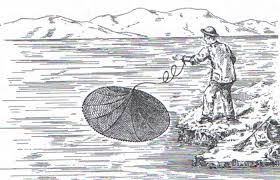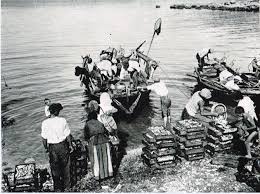Bokelians have always been oriented towards the sea as their main source of existence. While the fame of Bokelian sailboats boasted by rich shipowner's families and skillful sailors was spread throughout the world, the poor people of Boka were primarily geared towards fishing, the sea as a source of food and earnings. The best fishermen in Boka today are the fishermen from the Kotor villages Muo (in Kotor bay) and Bigova (in the region of Grbalj, at the open sea), where the fishing tradition remains still today.
Montenegro aligns its fisheries-related legislation with the EU legal framework, with particular attention being paid to the conservation of traditional fisheries, which, along with the conservation of fish stocks, cannot only be a source of healthy catches from the sea but also attractions for tourists and complement the tourist offer Montenegro. The valorization of this part of the legacy can also be assisted by the maritime and fishery terminology, proving fishermen from Muo are members of the Mediterranean fishing family, keeping up with the relics of "Lingua Franca Mediterranea", and the Dalmatian-Roman dialect.
The same boats were used in Boka as in Dalmatia: leut, gaeta, guc and spit. Most of the oak trees were used in the construction of a barn, followed by the pine, ashwood, beech and fir. They moved with a paddle, and each paddle came with a paddle. Along the Bokelian coast, there are still wooden boats, aged over 100 years, which are not recognized by Montenegro as part of our cultural heritage. Their owners, besides the boat registration, do not have any incentives for their expensive and painstaking maintenance.
 The fishing gear used for fishing in the Boka was to use nets, longlines, traps, spears. Some of these tools are still in use today. Particularly interesting is the traditional fishermen's hunting with a fishing net, whose pull-out on the "fishing post" (part of the sea and the coast where fishermen drop down and drain nets) and today an attraction for citizens and tourists. Although they enjoy legal protection, fishing posts in Boka are not protected today because a large number are devastated by sea and coastal interventions, destroying the sea bottom and reducing the fish stock. One of the last destroyed fishermen's posts is in Male Rose, Municipality of Herceg Novi, where part of the coast, foreseen to pull the net, contrary to the law was privatized and cemented.
The fishing gear used for fishing in the Boka was to use nets, longlines, traps, spears. Some of these tools are still in use today. Particularly interesting is the traditional fishermen's hunting with a fishing net, whose pull-out on the "fishing post" (part of the sea and the coast where fishermen drop down and drain nets) and today an attraction for citizens and tourists. Although they enjoy legal protection, fishing posts in Boka are not protected today because a large number are devastated by sea and coastal interventions, destroying the sea bottom and reducing the fish stock. One of the last destroyed fishermen's posts is in Male Rose, Municipality of Herceg Novi, where part of the coast, foreseen to pull the net, contrary to the law was privatized and cemented.
Fishermen have been fishing in the past individually or in a company. Fishing in a company was a "patrun" - a wealthy fisherman, a boat owner and other fishermen, six to twenty, mostly members of the wider "patrons" family and fishermen from the village. The fishermen went to scum and their sons because this profession passed on from generation to generation. Every fisherman in the company had his debts, and the salaries were shared by earnings.
The fish was sold directly from the boat that was sailing along the shore, and fishermen called buyers by yelling "fish, fish!". Another way of selling fish was at the "peškarija" (open air fish market), which existed in Kotor, Risan and Herceg Novi, where every fisherman had his own place of sale. The fish at the "peškarija" had to be sorted by species and packed in coughs, and controlled by the municipal physician. The fishermen also carried their catch on donkeys up to the so-called "upper villages" on Vrmac, which, like Gornji Stoliv, inhabited so many people that they sometimes, for an occasion like Christmas or Saint Nicholas, bought the complete catch of the Muo fishermen.
 At the beginning of the 20th century, fishermen began to join in co-operatives, but due to the rapid development of seafaring, tourism and industry, co-operatives and people turned to the professions that make safe money.
At the beginning of the 20th century, fishermen began to join in co-operatives, but due to the rapid development of seafaring, tourism and industry, co-operatives and people turned to the professions that make safe money.
Today in Boka Bay there is only a co-operative in Baošići, named Kiril Cvjetković. Professional fishing is dealt with by far fewer families and a smaller number of fishermen today use traditional fishing tools. At the same time, there are a small number of professional fishermen with modern equipment that can be competitive in terms of importing more fish in Montenegro than is caught in our waters.
Traditional fishing is in great danger of going into oblivion with the departure of generations that still inherit it. Because in today's economic conditions, you cannot blame a son who has no motive to ever wet and smell fish, nourishing the tradition of "no bread", with his father. In order to enable the use of these traditional tools in the future, it is necessary, above all, to ensure the protection of the fish stock. Gulf is, to some extent today, a protected fishing area, with accompanying laws and regulations, which must be aligned with the European Common Fisheries Policy. But the bay is still more and more polluted, under the pressures of wild building, unresolved sewage drainage problems, submarine devastation due to large cruise ship traffic, the effect of which is horrendous on the seabed.
The management of fisheries resources in Montenegro is based on sustainable fisheries' principles to prevent the abolition of certain species and disruption of the entire ecosystem community, but all endeavors of the Institute of Marine Biology will remain in vain until ecological problems (wastewaters, overburdening in the bay, uncontrolled and wild building) have been solved. The big problem is still the practice of illegal fishing, especially with explosive devices.








